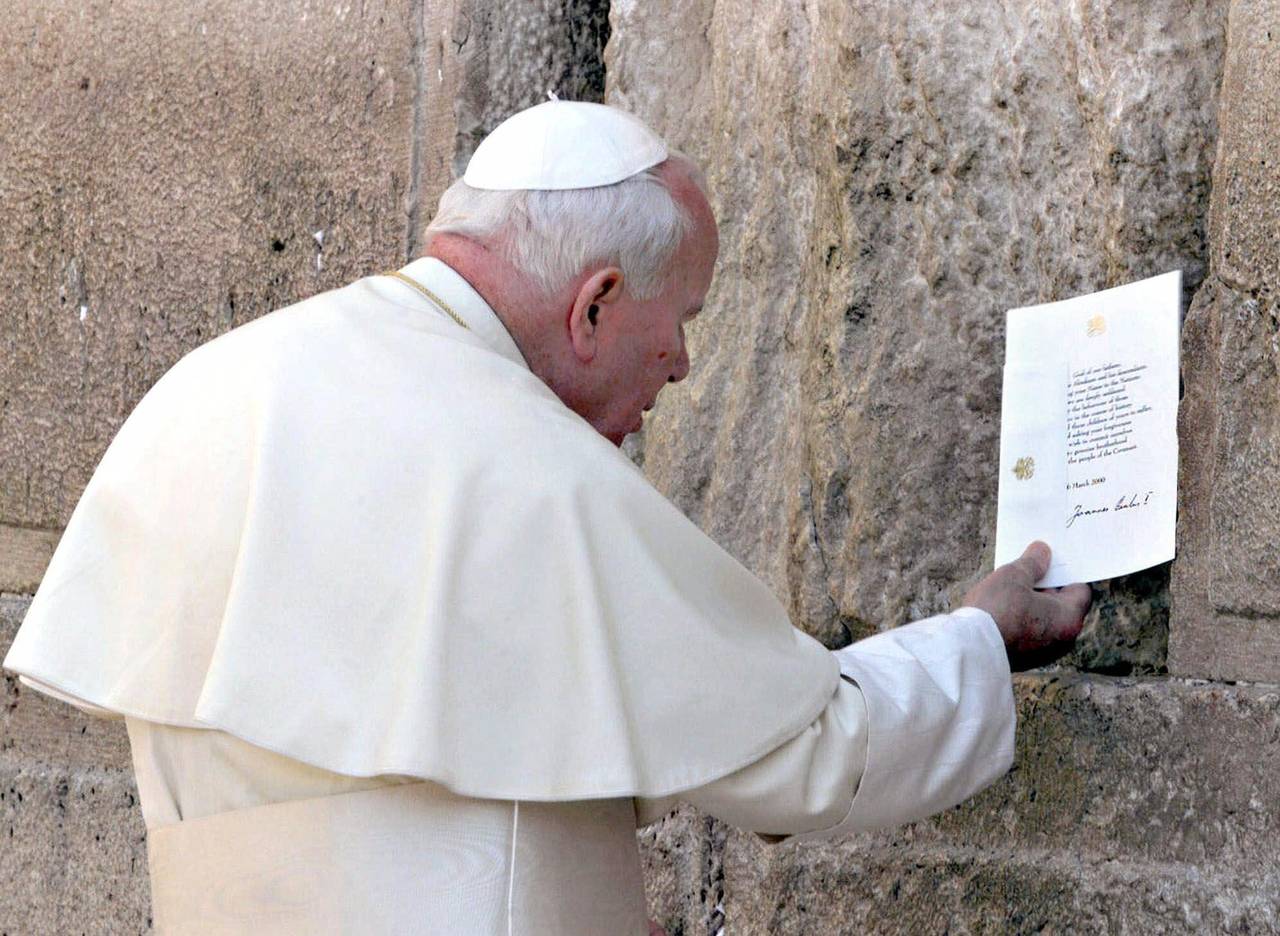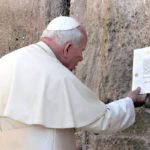Church apologies: Top leaders say sorry for historical sins
Jul 23, 2022, 5:48 PM | Updated: Jul 24, 2022, 5:57 am

FILE - Pope John Paul II places a typed and signed note into a crack at the Western Wall Sunday, March 26, 2000, in Jerusalem's Old City. He tucked the prayer note into the wall asking God’s forgiveness for those who "have caused these children of yours to suffer.” (Gabriel Bouys/Pool Photo via AP, File)
(Gabriel Bouys/Pool Photo via AP, File)
When Pope Francis apologizes to Indigenous groups on Canadian soil this week, he will make another effort toward healing harms inflicted at church-run residential schools — and add to the Catholic Church’s growing ledger of atonement for past transgressions.
Like the papacy, top Protestant leaders also have gradually issued institutional mea culpas for their churches’ historical wrongs. Many of the apologies on behalf of Christian denominations are for grave offenses: genocide, sex abuse, slavery, war and more.
While increasingly common, the ecclesial apology is a relatively modern phenomenon, said Jeremy Bergen, a church apology expert and professor of religious and theological studies at Conrad Grebel University College in Waterloo, Ontario.
“For 1,900 years, churches didn’t apologize for the bad things that they did,” Bergen said.
He pinpoints the pivot to significant apologies coming in the aftermath of World War II, especially a declaration by Germany’s Protestant churches that they failed to adequately oppose the Nazis. It was among the first in a series of recognitions that Christian institutions themselves committed wrongs, Bergen said. In the 1990s, church apologies increased as more attention was paid to human rights following the Cold War, he said.
The pope flew to Canada on Sunday to apologize for abuses Indigenous people suffered in the country’s state-funded residential Christian schools. From the 1800s to the 1970s, Native children were forced to attend the schools where abuse was rampant.
The apology follows a similar one Francis made in April in Rome to members of Canada’s First Nations, Inuit and Metis communities.
The setting matters, said Fernie Marty, a member of the Papaschase, a Cree nation in Alberta. The 73-year-old is a survivor of a day school — part of a system that, like residential schools, aimed to assimilate Indigenous children.
He appreciated the pope’s Rome apology, but “this is where all the atrocities happened,” Marty said. It’s “more meaningful coming on Canadian soil.”
Marty, an elder at Sacred Heart Church of the First Peoples in Edmonton, a Catholic parish in Alberta’s capital oriented toward Indigenous people and culture, said the pope’s visit offers “a tremendous opportunity for my own personal healing.”
But George Pipestem, 79, a member of the Montana First Nation and a survivor of the Ermineskin Indian Residential School, questioned the relevance of a papal apology, just as he questioned apologies by Canadian prime ministers for the government’s role in the schools.
He said the abusers should be the ones apologizing: “They’re all gone, though. This apologizing, it doesn’t matter to me. It’s like nothing. It’s only a word.”
It is not uncommon for a leader who was neither involved nor alive when a wrong was committed to deliver a church’s apology. Some took generations to say sorry.
Graham Dodds, a political science professor at Concordia University in Montreal who researches political apologies, says institutional responsibility can extend beyond the present day or any one person’s lifetime.
“It’s part of being a leader to accept that connection with things past,” he said.
St. John Paul II embraced that responsibility and left a legacy of papal apologies. None were more significant than his list of mea culpas issued as the Catholic Church opened its 2000 Jubilee and entered its third millennium.
John Paul apologized for Catholics’ sins through the ages, including against women, Jews and other religious minorities. In his most memorable act, he tucked a prayer note into the Western Wall in Jerusalem asking God’s forgiveness for those who “have caused these children of yours to suffer.”
He wanted “something of a clean slate,” Dodds said.
The following year, when John Paul sent his first-ever email, it was an apology for colonial-era abuses of Aboriginal peoples in Australia and the Pacific, as well as for the sexual abuse of children by Catholic clergy.
His successor, Pope Benedict XVI, also apologized for clerical abuse, most significantly in a 2010 letter to Irish faithful. He said he was “truly sorry” for the hurt and blamed Irish bishops, though he was silent on Vatican responsibility.
Francis has gone further, first apologizing for his own errors in defending a Chilean bishop who covered up abuse by the country’s most notorious pedophile priest. That 2018 scandal was a turning point in the pope’s understanding of abuse, and he continued to apologize for it.
Juan Carlos Cruz, who was abused by that priest, received both a church apology and a personal one from Francis. It felt like finally the church recognized the harm he suffered, and he could start healing, Cruz said. It also motivated Cruz, now a member of the Pontifical Commission for the Protection of Minors, to continue advocating for survivors.
“Pope Francis had a sincerity that it was hard not to believe. And it’s not because you’re sitting in front of a pope. … It’s because of his humility and sincerity,” Cruz said. “Trust me. I’ve received apologies from many people in the church that are as fake as you can imagine.”
Francis has also apologized, in 2015 in Bolivia, for wrongs committed by the church against Indigenous peoples during the conquest of the Americas.
Timing, word choice and contrition are important elements for an apology to be effective, Dodds said. Bad apologies try to justify or explain away wrongs, while good ones admit fault and convey, “It was wrong. … It won’t happen again. Please, forgive me,'” he said.
What comes next also matters, said the Rev. Dwight McKissic Sr., senior pastor of Cornerstone Baptist Church in Arlington, Texas. He is a Black minister in the predominately white Southern Baptist Convention, which was founded in 1845 in support of slaveholding missionaries.
It took SBC delegates 150 years to repudiate slavery and apologize for racism, in 1995. It was overdue and the right thing to do, McKissic said, but he wanted to see if the SBC would follow up with more leadership diversity.
He recalled visiting convention headquarters in Nashville in 2007 and being told the top African American working in the building was a custodian. When he returned recently, the top post was held by Willie McLaurin, the first Black man to head the SBC’s Executive Committee.
“That’s progress,” McKissic said, while cautioning that there is still room for “a lot of improvements” such as more diversity among leadership and seminary professors.
This year SBC delegates also apologized for harm caused to church sexual abuse survivors.
The United Church of Canada, the nation’s largest Protestant denomination, apologized more than 20 years ago for its role in operating 15 residential schools for Indigenous youths.
The Right Rev. Richard Bott, who is now the church’s moderator and top spiritual leader, said the institutional repentance and reparations his predecessor set in motion in 1998 remains a work in progress.
“This is not work that’s done in a day,” Bott said. “This is the work of a lifetime of response and an institutional lifetime of response. The only way we will get there is to begin each day in a good way with Indigenous neighbors. So that’s really central to our understanding of apology.”
When Francis apologized at the Vatican in April to the visiting delegation of Indigenous Canadians, he also listened to their personal stories of residential school abuse.
“They spoke truth,” Edmonton Archbishop Richard Smith said, and they told the pope they needed “to hear words from you that will heal.”
But when the pontiff comes to Canada, Smith said, it’s important that he doesn’t just read from a carefully vetted script: “Everybody wants him to speak from his heart.”
Smith said it can’t stop there. The Catholic Church in Canada will have to do much more than apologize to heal the wrongs at the schools. “This is about one step in a very long journey.”
___
Nicole Winfield in Vatican City contributed to this report.
___
Associated Press religion coverage receives support through the AP’s collaboration with The Conversation US, with funding from Lilly Endowment Inc. The AP is solely responsible for this content.
Copyright © The Associated Press. All rights reserved. This material may not be published, broadcast, rewritten or redistributed.















